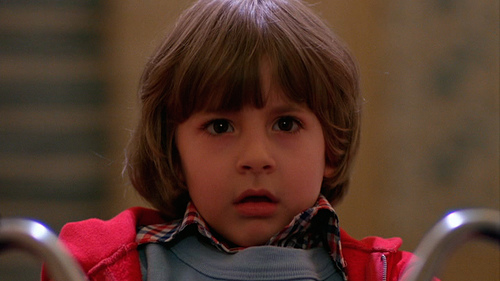Kubrick & Kids – The Work of a Dictatorial Director & His Child Stars
When asked to name a director known to work well with children, most people offer Steven Spielberg, or perhaps Brad Bird if they’re thinking laterally. I doubt the name Stanley Kubrick has often entered into the conversation despite the fact that he worked closely with underage actors in a large percentage of his films. Kubrick showed not only a mastery of the difficult art of directing young people but he also showed a parental protectiveness towards those children in his care. In this article I shall take a look at how he handled having malleable hearts and minds on the sets of controversial films such as Lolita, The Shining, and Eyes Wide Shut.
Vladimir Nabokov’s Lolita went from being a controversial novel to a controversial film with Kubrick’s 1962 adaptation. In the titular role, Kubrick cast the young Sue Lyon against James Mason. It was a difficult decision as not only did the actress need to be able to play a character at both 12 and 16 but there was also the tricky task of exploring an abusive relationship on screen. James B. Harris, Kubrick’s producing partner at the time, said, “We knew we must make her a sex object — she [couldn’t] be childlike. If we made her a sex object, where everyone in the audience could understand why everyone would want to jump on her, and you make him attractive; it’s gonna work.”
Both novel and film are told from Humbert’s (Mason’s) perspective, which required the sexualising of the character Lolita. Reportedly, the production received over 800 letters from parents claiming that their daughter “was” Lolita. The disturbing connotations of that aside, Kubrick cast the role towards the older end of the spectrum, preventing him from sexualising a prepubescent child at the very least. The film was heavily protested and censored, to the extent Sue Lyon was denied entry to the New York premiere. Kubrick’s own children were very young at the time. Perhaps a combination of the backlash of Lolita and his own journey into fatherhood contributed to his future choices with young actors, which seemed to be designed to protect them.
Kubrick’s daughter, Vivian, makes a brief appearance in 2001: A Space Odyssey as Squirt, Floyd’s daughter, on the video conference call. She would continue to stay involved with her father’s filming over the next several years, including an appearance in Barry Lyndon and directing the Making of The Shining. Her cameo here not only shows Floyd as a family man, but offers insight into Kubrick’s own fatherhood. The call so perfectly captures what it’s like speaking to a child; I would even venture to guess that Kubrick simply let his daughter say what she liked.
A Clockwork Orange doesn’t feature any children, but Kubrick’s 1975 effort, Barry Lyndon, relies quite heavily on two young actors. Books could be written about the beauty of Barry Lyndon’s cinematography, but for now, it’s worth noting the subtle performances he drew from the young men in the film. In particular, David Morley, the boy playing Bryan (Barry’s son), offers a wonderful turn as a spoiled brat who is constantly on the nerves of his half-brother Lord Bullingdon. A young man of 27 at the time, Leon Vitali was cast as the older Lord Bullingdon. When asked about Kubrick’s nature on set, particularly given that the director had a reputation to be a bit of a dictator, Vitali unequivocally disagreed. To paraphrase: he felt that Kubrick allowed the actors a great deal of freedom; had patience and understanding. Perhaps that sensibility led Vitali to continue working with Kubrick. You can see Leon running alongside Danny Lloyd in the making of The Shining, arguably Kubrick’s most notable case of working with a child actor. Young Danny carries most of the film, working alongside towering Hollywood giants like Jack Nicholson. However, Stanley Kubrick took one extraordinary painstaking measure during the filming of a somewhat gruesome and certainly terrifying horror movie: he didn’t tell Danny Lloyd that’s what they were making.
Many people read that and think that it’s not possible. But watch The Shining again, and this time, look carefully at the editing. Danny never shares cinematic space with anything truly frightening. The closest we get is a shot of the twins staring at him. He only ever shares created, imaginary space, all done through careful editing and expert storytelling. Kubrick placed the protection of a child’s innocence over the production of his film. Many of the rumours and reputations about him would lead one to believe he would do exactly the opposite. But, we must judge based on what occurred and not what is rumoured to have occurred.
Based on interviews with his family, friends, and co-workers, Kubrick was much the same about his own children. Every description I’ve found offers the picture of a loving family man who was very kind and very patient with children. Reportedly, he involved his children as much as they desired in his work; filming home movies with them, taking photographs. So often does one hear about the somewhat Machiavellian shrewd man, who manipulated his actors, tortured them even, but allow me to leave you with this from Nelson Mandela: “There can be no keener revelation of a society’s soul than the way in which it treats its children.”
Written by Jacqui Griffin



